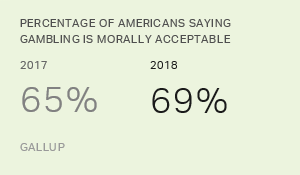Gambling Attitudes And Beliefs Survey
Posted : admin On 4/15/2022- Gambling Attitudes And Beliefs Survey Questionnaires
- Gambling Attitudes And Beliefs Survey Questionnaire
If Jesus were to ask, “Who do you say I am,” the question He famously asked his disciple Peter, He would be disappointed by some of the answers He’d receive from contemporary Americans. A new nationwide survey conducted by The Barna Group among a representative sample of adults explored how many have what might be considered a “biblical worldview.” The report from Barna compared current results to the outcomes from a similar survey the company conducted in 1995, 2000 and 2005.

Previously, the highest percentage of Americans saying gambling is morally acceptable was 67%, in both 2015 and 2016. The lowest level of acceptance on the question - one of a battery of questions about social issues included in Gallup's annual Values and Beliefs Social Series since 2003 - was 58% in 2009.
Attitudes, beliefs and impulsivity in online gambling addiction. International Gambling Studies: Vol. 18, The Neuroscience and Neuropsychology of Gambling, pp. In a broader market setting, we find that the magnitude of the negative lottery-stock premium is larger in high CPRATIO regions. Collectively, our results indicate that religious beliefs, through their influence on gambling attitudes, impact investors' portfolio choices, corporate decisions, and stock returns. Gambling Attitudes And Beliefs Survey, gambling in long beach ca, making poker a full time job, how to win at blackjack at the casino.

Defining Terms
For the purposes of the survey, a “biblical worldview” was defined as believing that absolute moral truth exists; the Bible is totally accurate in all of the principles it teaches; Satan is considered to be a real being or force, not merely symbolic; a person cannot earn their way into Heaven by trying to be good or do good works; Jesus Christ lived a sinless life on earth; and God is the all-knowing, all-powerful creator of the world who still rules the universe today. In the research, anyone who held all of those beliefs was said to have a biblical worldview.
Overall, the current research revealed that only 9% of all American adults have a biblical worldview. Among the sixty subgroups of respondents that the survey explored was one defined by those who said they have made a personal to commitment to Jesus Christ that is important in their life today and that they are certain that they will go to Heaven after they die only because they confessed their sins and accepted Christ as their savior. Labeled “born again Christians,” the study discovered that they were twice as likely as the average adult to possess a biblical worldview. However, that meant that even among born again Christians, less than one out of every five (19%) had such an outlook on life.
The same questions were asked of respondents in national surveys by Barna in 1995, 2000 and 2005. The results indicate that the percentage of adults with a biblical worldview, as defined above, has remained unchanged for more than a decade. The numbers show that 7% had such a worldview in 1995, compared to 10% in 2000, 11% in 2005, and 9% now. Even among born again adults, the statistics have remained flat: 18% in 1995, 22% in 2000, 21% in 2005, and 19% today.
Components of Worldview Thinking

Varying numbers of Americans embrace the different aspects of biblical worldview thinking. The survey found that:
- One-third of all adults (34%) believe that moral truth is absolute and unaffected by the circumstances. Slightly less than half of the born again adults (46%) believe in absolute moral truth.
- Half of all adults firmly believe that the Bible is accurate in all the principles it teaches. That proportion includes the four-fifths of born again adults (79%) who concur.
- Just one-quarter of adults (27%) are convinced that Satan is a real force. Even a minority of born again adults (40%) adopt that perspective.
- Similarly, only one-quarter of adults (28%) believe that it is impossible for someone to earn their way into Heaven through good behavior. Not quite half of all born again Christians (47%) strongly reject the notion of earning salvation through their deeds.
- A minority of American adults (40%) are persuaded that Jesus Christ lived a sinless life while He was on earth. Slightly less than two-thirds of the born again segment (62%) strongly believes that He was sinless.
- Seven out of ten adults (70%) say that God is the all-powerful, all-knowing creator of the universe who still rules it today. That includes the 93% of born again adults who hold that conviction.
Differences among Demographic Segments
Gambling Attitudes And Beliefs Survey Questionnaires
The research data showed that one pattern emerged loud and clear: young adults rarely possess a biblical worldview. The current study found that less than one-half of one percent of adults in the Mosaic generation – i.e., those aged 18 to 23 – have a biblical worldview, compared to about one out of every nine older adults.
Other groups that possess a below average likelihood of having a biblical worldview included people who describe themselves as liberal on social and political matters (also less than one-half of one percent); Catholics (2%); Democrats (4%) and residents of the Northeast (4%).
Ongoing research by The Barna Group on these matters consistently demonstrates the powerful impact a person’s worldview has on their life. A worldview serves as a person’s decision-making filter, enabling them to make sense of the complex and huge amount of information, experiences, relationships and opportunities they face in life. By helping to clarify what a person believes to be important, true and desirable, a worldview has a dramatic influence on a person’s choices in any given situation.
Barna’s research has discovered that there are unusually large differences in behavior related to matters such as media use, profanity, gambling, alcohol use, honesty, civility, and sexual choices.
Gambling Attitudes And Beliefs Survey Questionnaire
The firm’s studies have also pointed out that a person’s worldview is primarily shaped and is firmly in place by the time someone reaches the age of 13; it is refined through experience during the teen and early adult years; and then it is passed on to others during their adult life. Such studies underscore the necessity of parents and other influencers being intentional in how they help develop the worldview of children.
| For information about the Revolutionary Parenting Workbook, a new research-based resource that provides practical steps and advice to help parents shape the worldview of their children, click here |
George Barna, who has directed this tracking research since the early Nineties, pointed out, “There are a several troubling patterns to take notice. First, although most Americans consider themselves to be Christian and say they know the content of the Bible, less than one out of ten Americans demonstrate such knowledge through their actions. Second, the generational pattern suggests that parents are not focused on guiding their children to have a biblical worldview. One of the challenges for parents, though, is that you cannot give what you do not have, and most parents do not possess such a perspective on life. That raises a third challenge, which relates to the job that Christian churches, schools and parachurch ministries are doing in Christian education. Finally, even though a central element of being a Christian is to embrace basic biblical principles and incorporate them into one’s worldview, there has been no change in the percentage of adults or even born again adults in the past 13 years regarding the possession of a biblical worldview.”
| To find out which Christian teachings are most helpful in developing a biblical worldview, read Think Like Jesus. For more information, click here. |
Barna concluded by noting that the lack of movement in the worldview status of adults reflects the fact that children are not provided with the basic ability to think in ways that correspond to foundational biblical teachings. He noted that Christian families, Christian schools, and Christian churches would be wise to invest more effort and tangible resources into helping young people understand and adopt the core ideas of Christianity, and to reinforce those concepts through their own lives. His pointed out that without such an investment, the current generational patterns indicate that the future Christian Church is likely to be one that has even less of a connection to biblical principles than is evident today.
This report draws information from four nationwide telephone interviews conducted by The Barna Group, each including between 1,002 to 1,005 adults randomly selected, during the years 1995, 2000, 2005, and 2008. The range of sampling error associated with a survey of 1,000 people is ±1.5 to ±3.5 percentage points at the 95% confidence level. Each of the surveys utilized minimal statistical weighting to calibrate the aggregate sample to known population percentages in relation to several key demographic variables. All interviews were conducted among a sampling of adults in the 48 continental states.
As noted, “born again Christians” were defined as people who said they had made a personal commitment to Jesus Christ that was still important in their life today and who also indicated they believed that when they die they will go to Heaven because they had confessed their sins and had accepted Jesus Christ as their savior. Respondents were not asked to describe themselves as “born again.”
Readers are encouraged to realize that the figures described above regarding a biblical worldview are somewhat different than a similar measure reported by The Barna Group in prior years. The earlier measure included an additional component, which had to do with the source of their worldview. When that measure is included, it typically decreases the percentage of people with a biblical worldview by about half.
The Barna Group, Ltd. (which includes its research division, The Barna Research Group) is a private, non-partisan, for-profit organization that conducts primary research on a wide range of issues and products, produces resources pertaining to cultural change, leadership and spiritual development, and facilitates the healthy spiritual growth of leaders, children, families and Christian ministries. Located in Ventura, California, Barna has been conducting and analyzing primary research to understand cultural trends related to values, beliefs, attitudes and behaviors since 1984. If you would like to receive free e-mail notification of the release of each new, bi-monthly update on the latest research findings from The Barna Group, you may subscribe to this free service at the Barna website (www.barna.org). Additional research-based resources, both free and at discounted prices, are also available through that website.
© The Barna Group, Ltd, 2009.
Copyright Disclaimer: All the information contained on the barna.org website is copyrighted by The Barna Group, Ltd., 2368 Eastman Ave. Unit 12, Ventura, California 93003. No portion of this website (articles, graphs, charts, reviews, pictures, video clips, quotes, statistics, etc.) may be reproduced, retransmitted, disseminated, sold, distributed, published, edited, altered, changed, broadcast, circulated, or commercially exploited without the prior written permission from The Barna Group, Ltd.
Special Offer
Get 10% off your order when you sign up for email updates from Barna
New Research Explores How Technology Drives Generation Gap
While Americans of every age have become quite comfortable with and dependent on technology, a new study by The Barna Group explores how technology is shaping different experiences and expectations among generations.
In recent years, major debates have emerged about the societal impact of video games and the effect they have on the people who play them. Among the disputes: whether men predominate in gaming; whether games portray women and minorities poorly; whether violent games promote aggressive behavior; and whether games encourage positive attributes such as problem-solving skills, communication and teamwork.
A new survey from Pew Research Center covers these and other issues. The key results:
Equal numbers of men and women ever play video games, although men are twice as likely to call themselves “gamers”
About half of American adults (49%) “ever play video games on a computer, TV, game console, or portable device like a cellphone,” and 10% consider themselves to be “gamers.”
A majority of American adults (60%) believe that most people who play video games are men – a view that is shared by 57% of women who themselves play video games. But the data illustrates that in some ways this assumption is wrong: A nearly identical share of men and women report ever playing video games (50% of men and 48% of women).
However, men are more than twice as likely as women to call themselves “gamers” (15% vs. 6%). And among those ages 18 to 29, 33% of men say the term “gamer” describes them well, more than three times the proportion of young women (9%) who say the same.
Four-in-ten adults believe that violence in video games is related to violent behavior
Americans are relatively divided over whether there is a possible link between violent games and actual violence. A slight majority of the public (53%) disagree with the statement “people who play violent video games are more likely to be violent themselves.” But 40% agree that there is a relationship between video game violence and violent behavior. Some 32% of those who play video games themselves see a connection between games and violence, along with 26% of self-identified gamers. Women are more likely than men to agree (by a 47% to 31% margin) that people who play violent games are more likely to be violent themselves.
Among the general public, attitudes toward games are complex and often uncertain
The public is closely split on some other major debates surrounding the content of games and their impact on users. For instance, a quarter of all adults (26%) think most video games are a waste of time, while 24% think most games are not a waste of time. One-third think some games are a waste of time while others are not. And 16% of the public is unsure what to think about this issue.
A similar pattern is evident on the question of whether or not “most games help develop good problem solving and strategic thinking skills.” Some 17% of adults think this is true of most games, while 16% think this is not true of most games. Additionally, 47% think this is true of some games but not others, and 20% are not sure.
Asked whether games promote teamwork and communication, 23% of adults do not think most games promote these traits – more than double the 10% who think most games do promote these qualities. Some 37% think some games but not others promote teamwork and communication, while 28% say they are unsure. Similarly, 30% of adults do not think most games are a better form of entertainment than TV, almost triple the 11% who think this is true.
The public is much less certain on other aspects of gaming. Fully 47% of all adults are unsure if most video games portray minorities poorly, while 40% are unsure if most video games portray women poorly.
Compared with those who do not play video games, game players are more likely to agree with the positives and disagree with the negatives associated with games
Those who play video games themselves are more likely than non-game players to think positively about gaming:
- 25% of those who play games (and 39% of self-identified gamers) think most video games help develop good problem solving and strategic thinking skills, compared with just 8% of those who do not play games.
- 17% of those who play video games (and 34% of those who call themselves gamers) think most games are a better form of entertainment than TV. This compares with just 5% of those who do not play games.
- 15% of video game players (and 28% of self-described gamers) think most games promote teamwork and communication. Just 6% of those without gaming experience agree.
Game players are also particularly likely to disagree with negative portrayals of video games:
- 35% of those who play video games (and 53% of those who identify as gamers) think most games are not a waste of time. This compares with just 13% of those who do not play video games.
- 33% of those who play video games (and 46% of self-described gamers) do not think minorities are portrayed poorly in most games. At the same time, 9% of game players (and 10% of gamers) think most games do portray minorities poorly. Fully 61% of those who do not play video games are unsure what to think on this issue.
- 26% of those who play video games (and 35% of self-identified gamers) do not think women are portrayed poorly in most games. Meanwhile, 16% of game players (and 24% of self-identified gamers) think most games do portray women poorly. A majority of those who do not play video games (55%) are unsure what to think on this topic.